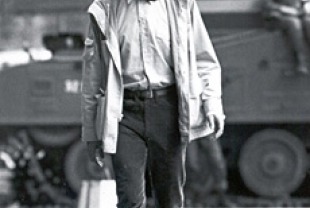Costa-Gavras's Missing, his first English-language, American-made work, is an emotionally riveting and thought-provoking 1982 film that still has the power to shake viewers out of their indifference to Latin America. Based on Thomas Hauser's 1978 nonfiction book, it is the story of fascism in Chile when military forces took over the government in 1973 and began a reign of terror. It is a tale of victims and victimizers and the web of deceit that is always spun out of tyranny.
Charles Horman (John Shea) is a freelance journalist and filmmaker living with his wife Beth (Sissy Spacek) in a South American country (some names and places of the real-life incidents have been changed "to protect the innocent and also to protect the film"). While Charles is out of the city showing a friend (Melanie Mayron) a seaside resort, a military coup occurs in the capital. Returning home a few days later, Charles is reunited with a very frightened Beth. They decide they should leave the country immediately. But before they can, he is abducted by a squad of soldiers. Beth frantically searches for him in a city under siege.
According to many historians, there is no history, only biographies. This film seems to say that forces, not men and women, shape our destinies. Edmund Horman (Jack Lemmon) arrives from New York to help search for his son. Beth, a political liberal, is convinced that the American officials at the Embassy are lying when they tell her the military regime does not have Charles. They even suggest her husband has gone into hiding.
Ed, a conservative, believes in using the proper channels. He and Beth visit hospitals, morgues, and, in a chilling scene, the soccer stadium where thousands of suspected "extremists" are being detained. As they continue to track down details surrounding Charles' disappearance, Beth becomes more cynical and Ed grows increasingly suspicious of the American officials (Charles Cioffi, David Clennon, Richard Venture) whose earnest desire to help seems forced.
Costa-Gavras (Z, The Confession, State of Siege, Special Section) believes that tyranny is always better organized than freedom; under the banner of order, violent forces are loosed upon the world. Missing graphically portrays the way a city is turned upside down by the military coup. Soldiers randomly machine-gun individuals who break the evening curfew; bullet-ridden bodies litter the streets; foreigners are not allowed to leave; citizens are afraid to talk to anyone lest they be arrested; sleep at night is interrupted by gunfire; friends and relatives of those held in detention have no way of knowing whether the prisoners are alive or dead. The forces of oppression hold everyone captive.
Missing questions the U.S. policy toward Latin America with its emphasis on "internal security" and its alignment with fascist regimes that protect American business interests. In the end, Ed's faith in the American cause is shattered. The truth of what happened to Charles is finally revealed. Even more shocking is the film's final sequence, a chilling reminder of bureaucratic inhumanity.
Robert Stone's novel A Flag For Sunrise is a stirring complement to this film's examination of American involvement in South America. Equally important is Jacobo Timmerman's nonfiction work Prisoner Without A Cell, Cell Without A Number, an account of tyranny in Argentina. In the book, the author states:
"If you add up all the victims and victimizers, they form such a small percentage of the world population. What are the others engaged in? We victims and victimizers, we're part of the same humanity, colleagues in the same endeavor to prove the existence of ideologies, feelings, heroic deeds, religions, obsessions. And the rest of humanity, the great majority, what are they engaged in?"
Missing won't let us look the other way. It compels us to weigh our values and see where we stand. By making this film, Costa-Gavras has done the world a great moral service.
